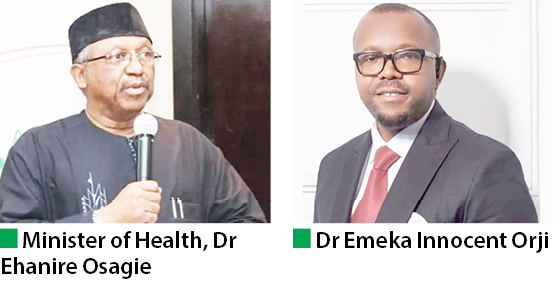The United Kingdom government recently placed Nigeria and 53 other countries on a red list of countries that should not be actively considered for recruitment by health and social care employers. In this report, health experts say it would not stop brain drain in Nigeria’s health sector and also proffered ways to address manpower shortage.
The United Kingdom government recently placed Nigeria and 53 other countries on a red list of countries that should not be actively considered for recruitment by health and social care employers.
The announcement was contained in its revised ‘Code of Practice for the international recruitment of health and social care personnel in England.’
The restrictions from UK comes on the heels of the ongoing outrage from medical associations in the country against the Medical and Dental Practitioners Act (Amendment) Bill, 2022, which seeks to mandate Nigerian-trained doctors, nurses and other health workers to provide services to Nigeria for up to five years before receiving a full registration and license to practice and emigrating the country. The Bill recently passed the second reading in the House of Representatives.
The WHO had on March 8, listed Nigeria and 54 countries as facing the most pressing health workforce challenges related to Universal Health Coverage.
The UK government, in the updated policy on social and health workers released in March 2023, said there must be no active international recruitment from Nigeria and other countries on the red list unless there is an explicit government-to-government agreement to support managed recruitment activities that are undertaken strictly in compliance with the terms of that agreement.
The UK defined active international recruitment in the code as the process by which UK health and social care employers (including local authorities), contracting bodies, recruitment organisations, agencies, collaborations, and sub-contractors target individuals to market UK employment opportunities, with the intention of recruiting to a role in the UK health or social care sector.
Its code read in part, “Consistent with the WHO Global Code of Practice principles and articles, and as explicitly called for by the WHO Global Code of Practice 10-year review, the listed countries should be prioritised for health personnel development and health system-related support, provided with safeguards that discourage active international recruitment of health personnel.

“Countries on the list should not be actively targeted for recruitment by health and social care employers, recruitment organisations, agencies, collaborations, or contracting bodies unless there is a government-to-government agreement in place to allow managed recruitment undertaken strictly in compliance with the terms of that agreement.
“Countries on the WHO Health Workforce Support and Safeguards list are graded red in the code. If a government-to-government agreement is put in place between a partner country, which restricts recruiting organisations to the terms of the agreement, the country is added to the amber list.”
The restrictions also do not apply to health workers from countries on the red list but who do not reside there or are in another red list country, it said.
Some of the other countries on the red list are Ghana, Congo, Afghanistan, Angola, Bangladesh, Benin, Burkina Faso, Burundi, Cameroon, Central African Republic, Chad, Comoros, Congo, Democratic Republic of Congo, Côte d’Ivoire, Djibouti, Equatorial Guinea, Eritrea, Ethiopia, Gabon, The Gambia, Guinea, Guinea-Bissau, Haiti, Kiribati, Laos and Lesotho.
The document also contains four countries – India, Malaysia, Philippines, and Sri Lanka on the green list, that is countries permitted for active recruitment based on a signed government-to-government agreement with the UK for international health and social care workforce.
Giving a picture of brain drain and health workers shortage in the country, President of the Nigeria Medical Association (NMA) Dr. Ojinmah Uche, said Nigeria has about 24,000 actively licensed physicians caring for its over 200 million population as a result of brain drain in the country.
He said this gives a horrible true ratio of approximately 1 doctor to 10,000 patients.
He said, “Only one doctor is incredibly available to treat 30,000 patients in some states in the south, while states in the North are as worse as one doctor to 45,000 patients. In some rural areas, patients have to travel more than 30 kilometres from their abodes to get medical attention where available, thus Nigeria making access to healthcare a rarity.”
Dr Ojinmah said based on the World Health Organisation (WHO) established minimum threshold, a country needs a mix of 23 doctors, nurses and midwives per 10,000 population to deliver essential maternal and child health services.
He said checks on the website of the General Medical Council (GMC)—the body which licenses and maintains the official register of medical practitioners in the UK, showed that the GMC licensed at least 200 Nigerian-trained doctors between August 31, 2022 and September 30, 2022.
“The statistics also showed that between January 1, 2022 and September 30, 2022, about 1,307 doctors trained in Nigeria were licensed in the UK as Nigeria continues to battle one of the worst situations of brain drain in its history. Overall, 10,296 doctors who obtained their degrees in Nigeria currently practise in the UK,” he said.
Also, the data from the register of the Nursing and Midwifery Council (NMC) of the UK shows that the number of Nigeria-trained nurses increased by 68.4 percent from 2,790 in March 2017 to 7,256 in March 2022.
Reacting to the UK policy, Dr Ojinmah said, “I don’t actually begrudge the UK for recruiting Nigerian doctors because it’s the poor treatment they are getting from Nigeria that’s pushing them away. If the Nigerian government and people place a premium on Nigerians, they obviously won’t migrate.
“It is okay that the UK is placing us on the lower rungs for recruitment but what about the United States of America, Canada, Grenada, Kingdom of Saudi Arabia, Oman, Qatar, Kuwait, South Africa, Germany etc?”
Asked the implication of UK’s restriction on Nigerian health workers, president of the Nigerian Association of Resident Doctors (NARD), Dr Emeka Innocent Orji, said the UK placed Nigeria amongst the 53 countries on the red list because it believes that Nigeria is among the countries that have severe manpower shortage for health.
He said, “The World Health Organisation has also collaborated the manpower shortage, so the UK is simply trying to at least not have an institution coming to facilitate massive migration of health workers from Nigeria without first interfacing with the Nigerian government.”
He said the UK’s restriction policy would not stop any health worker from going to the UK to practice because “even with this placement on the red list, the code also stated that an individual health worker can still apply and get absorbed in the UK to practice.”
He added that while the policy could reduce migration of health workers to the UK, it will not stop the brain drain Nigeria is battling in its health sector.
He said, “There are so many other countries that Nigerian health workers migrate to, it is not only the UK. We have also argued that it may not be in the interest of Nigeria as a country, because yes, we have this massive brain drain affecting the health sector, our doctors and nurses are leaving, but that tells you something about the training we are getting here. The fact that we also train in English language is an advantage for countries like UK or US to seek to employ Nigerian health workers.”
Dr Orji said what Nigeria is supposed to do is increase production of health workers.
“Because ultimately when we go there to work, we still repatriate the foreign exchange to Nigeria, you know that diasporan remittances is one of the major sources of forex in Nigeria. And in any case, we also go there to acquire more skills, and many people will end up coming back.”
The NARD president said it is therefore important that Nigeria invests in infrastructural development and in education and health.
“By doing so, we will develop capacity for production of more health workers while also actively improving on the remuneration. So that even people who have gone outside when they see that things are better down here will come back and that will actually reverse the brain drain. Those who have gone out and acquired skills and even stayed for some time will come back and impact on the healthcare delivery system of Nigeria.
“But government has to make the environment in Nigeria better than it is now. We have been talking about this for some time now. And it doesn’t look as if there is an active effort on the part of government to improve on the challenges that we have enumerated,” he explained.
Dr Orji stressed that until the government addresses the root causes of brain drain, it will continue.
“It doesn’t matter whether UK places Nigeria on the red list or not. The truth is that this restriction may not even cause any significant reduction in the level of emigration of health workers. The only thing that will address it is when government improves on the things we have identified,” he said.
He said the challenges fuelling brain drain that needed to be addressed are poor remuneration of health workers, insecurity, and rising violence against health workers, among others.
“The government has to quickly and actively intervene and in doing so, they should make efforts to carry the people, and associations in the health sector itself along because if they don’t do that, they may proffer solutions that will not work or end up worsening the problem.”
He lamented that one of them is the Medical and Dental Practitioners Act (Amendment) Bill, 2022.
He said, “They are trying to introduce a bill to forcefully keep doctors here for five years before they are licensed. And you can see the global outrage that it has caused. That is a very good example of a poorly researched bill that did not even carry along those in the health sector to give them vital information. Even the figures the sponsor of the bill quoted were wrong. So, the solution he’s trying to bring will not work. In fact, it will not be effective because you cannot train a doctor and when he is fully trained, withdraw his license for five years. Within those five years, what exactly is he going to be doing? Or you want to create a pool of unlicensed doctors who will be roaming the streets doing nothing? So, these are the issues.”




